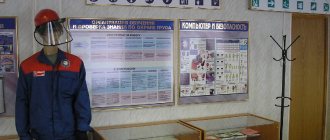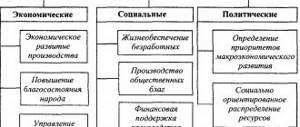Labor relations, hiring and dismissal, safe working conditions and other issues are controlled by a body such as the labor inspectorate. In its activities, it is guided by a whole list of legislative acts and standards, including the Labor Code, International Labor Organization Convention No. 81, ratified in the Russian Federation, and other documents.
The labor inspectorate is a body that both employees and employers can contact to protect their rights and interests. But so far little is known about the powers, responsibilities, and functions of this public service, although it could help citizens solve many problems at work.
What do a labor safety inspector and other employees of the authority do, why do we need a service such as a labor inspectorate?
Law
ATTENTION! The activities of the labor inspectorate must be carried out strictly in accordance with the law.
The list of documents related to the work of the labor inspectorate includes several items:
- Article 353 (part 1) of the Labor Code of the Russian Federation.
- Government Decree No. 324 “On approval of the regulations on the Federal Service for Labor and Employment.”
- Government Decree No. 156 “Issues of the Federal Labor Service...”.
- Federal laws 294 and 59.
- Order of Rostrud No. 211, it provides instructions on the regulations of the service.
- International Labor Organization Convention No. 81. In Russia it was ratified in 1998.
Tasks and functions of the State Labor Inspectorate
The main tasks of the federal labor inspectorate are: - ensuring compliance and protection of labor rights and freedoms of citizens, including the right to safe working conditions; — ensuring compliance by employers with labor legislation and other regulatory legal acts containing labor law standards; — providing employers and employees with information on the most effective means and methods of compliance with the provisions of labor legislation and other regulatory legal acts containing labor law norms; - bringing to the attention of the relevant government authorities facts of violations, actions (inaction) or abuses that are not subject to labor legislation and other regulatory legal acts containing labor law norms (Art.
355 of the Labor Code of the Russian Federation). The main powers of the federal labor inspectorate in accordance with Art.
356 Labor Code
What is Labor Inspectorate
According to the law, the Labor Inspectorate (TI) is a state body, a centralized system, the components of which are the main federal body and state inspectorates located in the regions.
ATTENTION! The TI is headed by the State Labor Inspector of the Russian Federation.
The Labor Code of the Russian Federation provides a lot of information on the work of labor inspectors, the main one is in Article 353. The chief labor inspector, GIT, is an important person in labor law.
He or other TI employees may initiate inspections at enterprises, companies, organizations in order to identify violations of labor protection or other issues. Often such checks are carried out upon a signal from employees, but can also be planned. The powers of the labor inspectorate are quite broad; this body can be quite effective in protecting the rights and interests of workers.
What types of labor inspection inspections exist? A visit of a labor inspector to an enterprise for the purpose of inspection can be either planned or unplanned:
- A planned inspection of an enterprise or company is usually known in advance. According to the standard, it takes place every two years. If the company has just started its activities, the inspection is not carried out for three years.
- Unscheduled inspections can be carried out at any time if there is a reason for them. They take place individually, upon a signal from one of the employees. For example, in case of dismissal in violation of labor laws or when dangerous working conditions are created at enterprises.
- The inspection is carried out with a general study of documentation; it cannot be carried out only in relation to one employee . Typically, violations, if management allows them, affect many of the staff, sometimes the entire team.
You can send an appeal to Rostrud
Rice.
1 (click to enlarge). The “Submit an appeal” button on the official website of Rostrud. The official website of the Rostrud organization, where you can leave (write and send) your appeal about violation of your rights as an employee, is located at the link below:
Rostrud https://www.rostrud.ru/
On the main page of this site, that is, on the page that will open immediately after clicking on the address above, there is a clearly visible “Send a request” button (Fig. 1). You need to click on this button if you are ready to write your appeal to the labor inspectorate regarding the violation of your rights and the rights of an employee.
After clicking on the “Send a request” button, a page will appear for writing a request and sending it for further consideration (Fig. 2):
Rice. 2. The official website of the Rostrud organization, a page for writing and sending an employee’s appeal about a violation of his rights.
The fields marked on the page (Fig. 2) with a red asterisk are required to be filled out. These fields include those marked with numbers 1, 2, 4, 5, 7, 9, 11 and 12:
Subject of the appeal (1 in Fig. 2) - you need to select from the menu that opens if you click on the small black triangle in this field. After clicking, three options will appear:
- Consult on questions asked
- Organize verification of the stated facts
- Other
You should click on one of the three options.
Appeal (2 in Fig. 2) – the text of your message to Rostrud. You should try to make the text as accurate as possible, without unnecessary emotions, unnecessary words and digressions that are not relevant to the matter. It also makes no sense to immediately give your conclusion, for example, “The employer has violated the law...” or “The employer does not comply with the collective agreement...”, etc. The labor inspectorate will better understand who violated what; this is its main job. In the appeal, it is important to indicate the facts, as many accurate and specific facts of violations as possible.
It is necessary to describe the current situation in detail and clearly. For example: “My earnings from such and such a month and year have become 20% less with the same amount of work.” Or: “I was transferred from such and such a position to such and such a position without my consent on such and such a date,” “I was laid off (dismissed) on such and such a date without notifying me in advance and without paying compensation,” “Instead of a vacation, I for child care they were offered voluntary dismissal” and the like.
You can attach some files (3 in Fig. 2) - we are talking about documents confirming the fact of applying to the labor inspectorate. You can attach, for example, an order about your illegal dismissal or reduction, or rather not an order, of course, but a scan of it, a copy of it. In one request you can attach no more than 5 files, no more than 5 documents. Each file must be no more than 25 megabytes in size.
Well, if you need to send more files - there may be different situations, including those where there may be many documents - then it is possible to archive these numerous documents using the free 7-Zip program or the paid WinRar program. And then attach the completed archive to the appeal - one single file in which all the documents for clarification will “fit” at the same time. For example, if 30 people were fired at once, you can attach all 30 dismissal orders using the file archiving capabilities of the program.
It is necessary to indicate your first name (4 in Fig. 2), last name (1 in Fig. 2) and your email address (7 in Fig. 2). The telephone number is optional (8 in Fig. 2).
Next, you should check the box how you want to receive a response: by email or by Russian post. After consideration of the application, the applicant will receive a response either by mail to his specified postal address or to his specified email address. The choice of delivery method is made by checking the box in this section “Get a response” (9 in Fig. 2).
Information about the organization is optional and does not need to be filled in (10 in Fig. 2). Such information includes: name of the organization, actual and legal address, INN/OGRN, information about the manager.
If you still decide to “go all the way” and sort things out with your organization, with your employer, then you should then provide information about your company. In this case, it will be useful to indicate at least the name of the enterprise and its actual address, where it is located, where you go to work. Then the answer you receive may be more clear.
It is impossible to give an unambiguous answer to vague requests. If you write: “Oh, I feel bad!”, or “I’m being fired!”, but do not indicate what kind of company you work at, where it is located, in what city or town, what is the background of your dismissal, and etc., then the answer will be in the style: “Hold on!” Of course, not in this form, it will be a completely official, moderate, emotionless, precise administrative response. But they won’t help you with anything else.
According to the law on working with citizens’ appeals, an answer will definitely come. But what it will be like cannot be said with certainty. Each specific case will have its own answer to the situation that the employee outlined in his appeal.
You must check the box (11 in Fig. 2) opposite the captcha to verify the fact that you are not a robot, but a living person. This allows you to distinguish your message from automated robot programs that send spam to any site.
You will also need a check mark (12 in Fig. 2) confirming your consent to the processing of your personal data.
At the end of the righteous labors, you must click the “Submit” button, after which your appeal will be processed on the Rostrud website.
Main tasks of the work
The labor inspectorate is obliged to protect the rights of workers guaranteed by the Constitution. Inspectors monitor how safe working conditions are, how payments are made for fulfilling labor obligations, and whether workers receive compensation for accidents at work.
The Labor Inspectorate is an important government body that must monitor compliance with Russian labor legislation in the country. At the same time, the interests and rights of both parties to the labor relationship - the employee and the employer - are considered.
How is the verification carried out?
The inspector requests the entire set of documentation at the inspection site . Only after carefully studying it can you be sure whether or not the head of the enterprise violates the law in relation to his employees.
The inspection lasts for one time or another and concerns those areas of activity of the enterprise or organization that are covered by the competence of the TI. It is possible to study business documents and technical documentation. When the inspection is completed, a report is drawn up, indicating the results of the inspection activities.
Rules for conducting inspection activities
The inspector is obliged to provide the management of the enterprise where he will conduct the inspection with a document on the appointment of inspection activities. The manager must know for what purpose the inspection is being carried out and by whom (name of the legal entity).
He should also get a sufficient understanding of the labor inspector. Such documents must reflect the timing of verification activities.
IMPORTANT! The inspection must be carried out in compliance with legislation in this area.
These are Federal laws numbered 90, 157, 206, 421. You need to know that the powers of labor inspectors are not unlimited, they cannot go beyond the limits established by law. But still, they have effective ways of identifying violations, punishing those responsible, and protecting injured workers.
The main body that monitors compliance with laws in the field of labor relations is the Federal Labor Service (Rostrud). Such a service has many branches throughout the state, and it is they who must respond quickly and effectively to requests from the population.
Regional bodies from Rostrud are called State Labor Inspectorates in the Federal Subjects of the Russian Federation.
The powers of the State Inspectorates operating in various territories of the country and Rostrud are identical. Their main task is to monitor compliance with labor laws.
What can state inspectorates do? Their main function is to monitor the employer’s compliance with labor standards. Inspections organize audits, scheduled or unscheduled inspections.
Also, employees of this government body can assess the opinions of the company’s personnel and conduct surveys. Inspection of documents for certain employees is also carried out.
Representatives of the state inspection must indicate the identified violations, as well as recommendations for their elimination, in the report
Structure
The Federal Labor Inspectorate is a special centralized system. At the head of this system is the federal executive body. Its main task is to constantly monitor compliance with current labor legislation in our country. In this case, we can talk about both the provisions of the current Labor Code of the Russian Federation and other regulations that are regularly adopted by authorized bodies.
The main tasks of monitoring compliance with the provisions of modern labor legislation are assigned to the Federal Labor Service. In short, this authority is called Rostrud. To carry out all important tasks, Rostrud was endowed with the most diverse and numerous powers. The head of Rostrud is the chief state labor inspector in the Russian Federation. His appointment to this position, as well as subsequent removal, is carried out by official order of the Government of the Russian Federation.
It should be noted that regular monitoring of compliance with labor standards established by law is by no means the only task of Rostrud. In the course of his activities, he is assigned other, very diverse obligations. The most common and important of them include:
- Monitoring the constant increase in the level of employment of the population. For this purpose, Rostrud may develop and approve separate additional acts for interaction with organizations such as employment centers in our country.
- Taking an active part in the processes of resolving modern labor disputes. As current practice shows, conflicts between employees and their employers arise regularly for a variety of circumstances. This may include, for example, violation of the rights of employees for irregular receipt of wages, failure to comply with established rules regarding the provision of paid leave to subordinates, etc.
- Exercising constant control over labor migration in our country. Maintain proper records and statistics.
- Perform other regular tasks directly related to professional relationships.
Basics of activity
The activities of the Federal Labor Inspectorate must be entirely subject to the legislative norms existing in our country. The main one, of course, is the Constitution of the Russian Federation. In addition, in its activities the Inspectorate must take into account the current provisions of labor legislation, Decrees of the Government of the Russian Federation, international treaties, as well as other legal acts.
If we talk about the main tasks of this authority, they include:
- Ensuring adequate protection of labor rights and freedoms that are provided to citizens in our state. This may include, for example, the right to safe work, to free choice of profession, to non-discrimination by employers on personal and other grounds, etc.
- Ensuring that modern bosses comply with the current provisions of labor legislation. As current practice shows, employers regularly commit a variety of violations. They, in turn, can be expressed in certain prohibited actions of the boss or inaction on his part. Their main feature will always be a violation of the provisions of the Labor Code of the Russian Federation, as well as other regulations in modern labor legislation.
- Timely provision of up-to-date information to employers and their subordinates regarding the most effective and easiest ways to comply with modern legal provisions.
- Providing authorities with timely information regarding various labor violations that were officially recorded by the authorized body.
To carry out all the above tasks, the Inspectorate was vested with a variety of powers. Its legal rights also include the ability to establish official punishments for those responsible. In case of recording really serious violations on the part of the employer, the authorized body can prepare all the necessary materials for their subsequent sending to a judicial institution.
Authority
The most important powers that are regularly used in the activities of the Labor Inspectorate include the following:
- Carrying out constant monitoring of the legality of the activities of modern employers in our country. As you know, the work of absolutely every organization must comply with all current rules of labor legislation. In particular, during employment, the manager must conclude an official contract with the new employee, every year the director is obliged to provide the subordinate with paid leave, etc. Failure to comply with at least one rule will be a serious violation on the part of the employer. For this, liability measures provided for by law may be established against him.
- Conducting an ongoing analysis of the reasons and various important circumstances in which a serious violation of the rights of subordinates occurred. Such monitoring is required, first of all, in order to prevent similar violations in the future and to make the work of the Labor Inspectorate as efficient as possible.
- Taking an active part in the consideration of cases of civil violations that were committed by the employer. Such violations may be detected during an inspection initiated by the authorized body. For example, an employee who believes that the employer has violated his rights and interests will have a full opportunity to appeal to the Labor Inspectorate. This is done by submitting a written application to the authorized authority. After receiving such a document, the Inspectorate, in turn, will have the right to decide to schedule an unscheduled inspection of the organization’s activities.
- Collection of all necessary information for subsequent sending of documents to executive authorities. As a rule, this option is used in the event of a serious violation on the part of the employer. In such a situation, the collected materials can be sent not only to a judicial institution, but also, for example, to the prosecutor's office for further proceedings. In this case, the employer may face truly serious penalties for violations, including criminal penalties.
- Exercising constant control over the competent conduct of accident investigations by the employer. Any accident at work is an unusual situation in which the person in charge will have some important responsibilities. In particular, the head of the company will be required to properly conduct an internal investigation into the incident. For this purpose, a special commission is being created, which will clarify all the important facts and circumstances. At the end of its activities, the commission will be required to draw up an official act. It indicates the immediate causes of the accident, as well as other important information. Violation of the established regulations of the investigation procedure will be a serious crime on the part of the employer.
- Conducting an ongoing analysis of industrial injuries in our country. Developing the most effective methods to reduce current injury rates to the minimum possible. Approval of certain federal acts on the issue of increasing the level of employee safety at various enterprises in our country.
- Exercising constant control over the correctness and correctness of the implementation of the fundamental rights of employees, which are guaranteed to them by current legislative norms. This may include, for example, registration of compulsory social insurance, work in an official manner with the preliminary conclusion of an agreement and making a corresponding entry in the work book of a subordinate, etc.
- Filling out official requests to executive authorities, as well as to various other authorities, provided that the information received is required by the Inspectorate to carry out current tasks in the field of labor law.
Existing norms establish that in its activities the Labor Inspectorate should not exceed its powers. Otherwise, the penalties established by it will be considered unlawful. This, in turn, will become a full-fledged basis for their complete cancellation.
Drawing up an act
The act is drawn up according to a standard scheme and must contain the following important information:
- The name of the organization or enterprise where the inspection was carried out by labor inspectors.
- List of violations of labor laws, if they were identified.
- Recommendations to the manager for eliminating identified violations.
- List of penalties for violations - fine, warning, etc.
- Information about the inspectors involved in this inspection.
- Verification deadlines.
Functions of labor inspectors
Inspectors represent a body whose main task is to verify compliance with labor laws at every enterprise, in any company or organization. During the inspection, of which the management of the enterprise must be notified, inspectors can perform the following actions:
- Check constituent documents, collective agreement.
- Conduct a review of the organization's schedule.
- An audit of time sheets and salary statements is carried out.
- The inspector can check the completion of work books.
- An important function of the labor inspectorate is to check the working conditions of personnel.
Often inspectors arrive at enterprises after various emergencies or accidents with employees. In such situations, the inspection is carried out taking into account the incident:
- The inspector is investigating the causes of the accident.
- Analyzes why workplace injuries became possible.
- It is checked what preventive measures are taken at the enterprise regarding possible accidents.
- The inspector must check whether all payments due under NS have been paid.
- Also, such an inspector can conduct consultations among personnel on issues of protecting rights and legal norms.
If necessary, the labor inspector may temporarily suspend specialists from performing their duties and limit the activities of legal entities. He has the right to impose fines and apply other punitive measures if violations are detected in the organization of work, maintaining documents and in other areas.
ATTENTION! The results of the inspection can be transferred to the prosecutor's office or court, if necessary.
Scheduled and unscheduled inspections
Scheduled audits can be carried out no earlier than three years after the start of operation of an enterprise or company. Then the inspection schedule is once every two years. Inspection activities can be comprehensive, when all circumstances related to the issue of labor legislation are checked, or thematic ones.
A thematic audit may consider wages, for example, or the implementation of a collective agreement.
When is an unscheduled audit carried out? There may be several reasons - a statement about dangerous working conditions, a violation of labor law. The head of Rostrud can also order an inspection after a government order.
Forms and types of control
The inspectorate is authorized to carry out two types of inspections:
- Planned,
- Unscheduled.
These checks are also documentary and on-site.
Scheduled inspection
Attention! Inspections of this type are carried out after three years from the date:
- state registration of a legal entity,
- when an individual entrepreneur began to conduct his business,
- completion of the last similar check,
Such verification activities can be complex or thematic. Comprehensive ones involve organizing verification of compliance by the inspected entities with the requirements of labor standards in the complex of a separate issue, for example, on labor protection.
As for thematic inspections, they are carried out according to individual specific sections of labor standards.
These types include: checking the working conditions of a particular category of employees, whether the employer fulfills the requirements relating to payment, maintaining documentation (employee work books), compliance with the rules and procedure for drawing up collective agreements, their adjustments and additions.
Responsibility for the absence of an employment contract.
Unscheduled inspection
Such checks are carried out at intervals between the previous ones.
The reasons for their implementation are:
- the deadline for the violator to comply with the instructions left to correct the situation has expired,
- statements were submitted to Rostrud informing about the emergence of a threat or facts that resulted in harm to the health or life of an employee,
- an appeal was received from one of the employees (team) about a violation of labor rights,
- the employee initiated an inspection of his workplace to establish the employer’s compliance with established working conditions and safety measures,
- direct order of the head (deputy) of Rostrud, submitted on the basis of a presidential or government order.
Documentary verification
This type of inspection is carried out at the location where the TI authorities are located on the territory.
During such events the following documentation may be requested:
- confirming the fact that the labor relations between the parties are formalized in accordance with the law (signed with TD employees, orders for hiring and dismissal, instructions for positions, schedules, work books of employees, etc.),
- acts approved by the employer (collective agreement, regulations on pay and bonuses, rules establishing the work schedule in the organization, instructions related to labor protection, etc.),
- relating to the recording of working time, rest (schedules for employees taking vacations, sick leave, time sheets, etc.),
- for payments for work performed. This should include: statements on the issuance of wages. fees, pay slips, accounts for each employee, etc.
Each of these documents is requested in originals with additional confirmation that employees have read them.
On-site inspection
Attention! It is initiated only when, during a documentary check, the inspection is not convinced that the information received on the employer is reliable and provided in full, or when it is not possible to make an accurate assessment of the organization’s compliance with labor legislation.
The audit determines what measures have been taken by the employer in order to comply with these legislative norms. In addition, actual work locations are compared with the number of employees using equipment, vehicles, territory, structures and individual premises.
Watch the video. How to contact the Labor Inspectorate?









